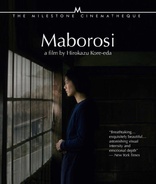Maborosi Blu-ray Movie
HomeMaborosi Blu-ray Movie 
幻の光 / Maboroshi no hikariMilestone | 1995 | 110 min | Not rated | Jul 10, 2018
Movie rating
7.7 | / 10 |
Blu-ray rating
| Users | 0.0 | |
| Reviewer | 4.0 | |
| Overall | 4.0 |
Overview
Maborosi (1995)
A young woman's husband apparently commits suicide without warning or reason, leaving behind his wife and infant. Yumiko remarries and moves from Osaka to a small fishing village, yet continues to search for meaning in a lonely world.
Starring: Makiko Esumi, Takashi Naito, Tadanobu Asano, Akira Emoto, Mutsuko SakuraDirector: Hirokazu Kore-eda
| Foreign | Uncertain |
| Drama | Uncertain |
Specifications
Video
Video codec: MPEG-4 AVC
Video resolution: 1080i
Aspect ratio: 1.85:1
Original aspect ratio: 1.85:1
Audio
Japanese: LPCM 2.0
Subtitles
English
Discs
Blu-ray Disc
Single disc (1 BD)
Playback
Region A (B, C untested)
Review
Rating summary
| Movie | 4.5 | |
| Video | 4.0 | |
| Audio | 4.0 | |
| Extras | 2.0 | |
| Overall | 4.0 |
Maborosi Blu-ray Movie Review
Reviewed by Jeffrey Kauffman June 23, 2018Arrow UK recently released Family Values: Three Films by Hirokazu Kore-eda, and one of the things I mentioned in my reviews of that trio of intimate stories often focusing at least partially on children is how the Japanese tendency toward not wearing emotions on one’s sleeve plays into the presentational aspects of all three films to a greater or lesser degree. It’s kind of interesting to compare and contrast the traditional Japanese reserve with the more histrionic reactions of, say, some European or Middle Eastern cultures, where grief in particular tends to be displayed in outsized reactions that are often hysterical (without any of the pejorative and/or gender based “baggage” that that particular term has come to carry along the way). A lot of the initial response to Maborosi, Kore-eda’s first feature film after a long career in Japanese television, compared Kore-eda’s approach to other Japanese masters like Yasujirō Ozu, but I’d posit a perhaps tangential but hopefully salient comparison in terms of how Kore-eda manages to convey his characters’ emotions without going full throttle on over the top displays: Romantic poets like Wordsworth and Coleridge. Though the language this era’s writers used tended to be on the flowery, often hyperbolic, side, one of the recurrent motifs in many of the iconic Romantic works is how external phenomena like weather tended to reflect the interior worlds of the writers. That “as above, so below” (or perhaps more accurately “as outside, so within”) tendency definitely informs Maborisi, especially after a heartbreaking tragedy interrupts the seemingly idyllic (if already troubled) life of young housewife and mother Yumiko (Makiko Esumi).
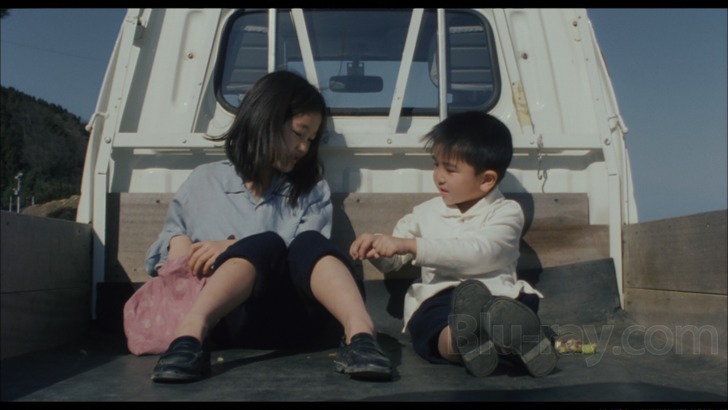
Note: There's one inescapable plot point that must be mentioned in order to discuss Maborosi intelligently, a plot point which I guess some might consider to be spoiler material, even though it's prominently mentioned on the very cover of this release as well as every summary of the film I've ever read. For those wanting to come to Maborosi "cold" (so to speak), you're encouraged to skip the following comments.
As Linda Ehrlich alludes to in her commentary included on this Blu-ray as a supplement, there’s a dreamlike quality to Maborosi (a title which can be variously translated as “illusion” or “mirage”, itself a hint as to the frequent tenor of the story), and in fact the opening sequence turns out to be a dream, albeit one that is evidently based in memory. An elderly woman walks across a rather imposing bridge and is chased after by a little girl. The little girl begs the woman to come back, but the elder states that she wants to die in her birthplace and toddles off, literally into the sunset. The girl returns home and is greeted by the sight of a sweet little boy walking next to his bicycle. In a kind of interesting “black screen” moment, Kore-eda then indulges in a brief but arresting sequence with no imagery, instead focusing on two voices discussing this dream. It turns out it’s a recurring nighttime vision for Yumiko, who is recalling the mysterious disappearance of her grandmother (a woman perhaps suffering from dementia), a disappearance for which Yumiko herself feels responsible. The little boy spied at the end of the dream is now Yumiko’s husband, factory worker Ikuo (Tadanobu Asano). Yumiko and Ikuo seem to be happy despite their less than opulent living conditions, and they are both joyous parents to an adorable little baby boy named Yuichi (played by Gohki Kashima as a little boy for the bulk of the film).
Seemingly random shots of trains and bicycles suddenly achieve new relevance when either an accident or (more likely) a successful suicide attempt by Ikuo upends Yumiko’s arguably already fraying psyche. The film segues forward several years after this horrifying tragedy to find Yumiko attempting to raise her little boy as a single mother, finally conceding to try an arranged marriage with a man she’s never met. That sets up the bulk of the rest of the film, with Yumiko and Yuichi trying to assimilate not just into a new family but into a whole new environment. While it’s here that the Romantic proclivity towards having an external reality mirror an interior state is probably most evident, it’s also here that an already slow pace becomes arguably glacial, leading to what some may feel is a loss of momentum that deprives the film from attaining true catharsis.
Still, this is an often ravishing and almost always meditative effort that moves inexorably from (repeated) tragedy to a kind of resigned state that nonetheless may actually augur at least a bit of hope. As always, Kore-eda shepherds his performers carefully, and once again there’s an almost magical realist quality to some of the interactions between the children. Perhaps surprisingly, this was Esumi’s first feature film performance after a modeling career, but she manages to create a fully formed character who is forced to deal with perhaps unanswerable questions.
Maborosi Blu-ray Movie, Video Quality 
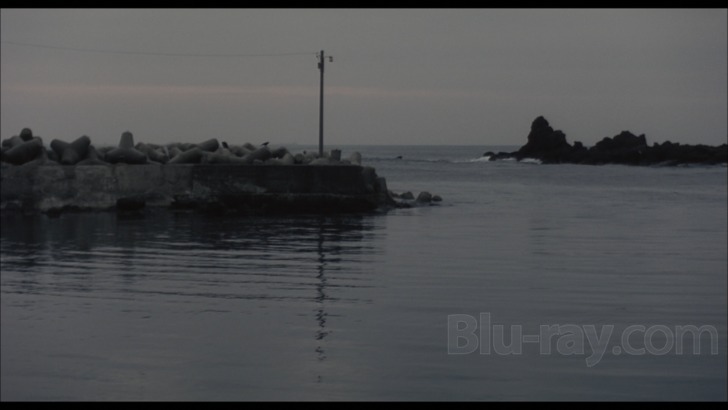
Maborosi is presented on Blu-ray courtesy of Milestone Films with an AVC encoded 1080i transfer in 1.85:1. I'm frankly a little conflicted
about some aspects of the appearance of this release, and for that reason I highly recommend fans carefully parse the screenshots included with
this
review in order to help inform their own opinions. I have yet to see Maborosi in a theatrical exhibition, and so I am basing the following
comparison comments on DVD versions I either owned or viewed. As Kore-eda aficionados will know, Maborosi has had several previous
DVD
releases, and two of them (the Spectrum and Bandai releases) both had the slightly skewed chroma and luma levels that this release also has,
something that tends to make contrast and black levels look a bit anemic at times. That said, the "true black" moments, like the opening pre-
imagery
black screen or even the interstitial image free moments look solid, something that tends to support the thesis that Kore-eda was going for a kind of
hazy, dreamlike look (and it should be noted Milestone's press materials tout this as a director approved HD master). The entire look of this film is
intentionally diffuse and soft, aspects that are either
elevated or exacerbated (depending on your reaction) by Kore-eda's well publicized choice to use only natural lighting throughout the film. With
that in
mind, it's understandable that the outside material tends to pop with a good deal more vividness than the sometimes kind of drab looking interior
work. Some of the darkest moments suffer from crush (look for example at the first scene with the train where black outfits tend to be swallowed
up
by the shadows, leading to a kind of "disembodied head" moment). There's also a bit of wobble in the opening credits. Finally, grain is somewhat
variable, at times rather minimal
and at other times (notably the final seaside sequences) more visible (even looking a bit splotchy in the film's final moments). That variability aside,
though, apart from the inherent softness and Kore-eda's tendency to go for midrange shots rather than close-ups
(something Ehrlich spends some time analyzing), while there isn't a ton of fine detail, there's also no sign of smearing or waxiness. Perhaps due to
the interlaced presentation, there are several clear examples of "stair stepping" or "jaggies", starting with the circle of the Milestone Films logo and
also
tending to afflict thin lines like the tramlines over the railroad station (see screenshot 4) or even the spokes on bicycle wheels (broader and/or
thicker straight
lines like the borders
of the panels in some of the doorways escape this particular anomaly). Anyone who has
had one of the better DVD releases will probably appreciate this release even if they do have occasional qualms, as I do (those with the New Yorker
Video DVD release, which had a pretty radically skewed palette which frankly looked more "natural" but which I suspect was not true to the
theatrical
exhibition, may be in for a bit of a shock). I'm scoring this at 4.0 since for me personally it's a substantial upgrade over the DVDs and a lot of the
transfer is quite nice looking, but there are some issues here that a better master/encode may have been able to ameliorate if not completely
eliminate.
Update: I've already had several PMs asking if this release is "really" interlaced, and just for clarification's sake, I always check resolutions
with PowerDVD. I, too, was surprised to see this, and actually put in another disc that I know is progressive to see if the program had glitched
somehow, but that other disc accurately showed as progressive. If this turns out to be a PowerDVD issue (which, frankly, would not
surprise me, though I don't think that's the case here), I'll of course update things here.
Maborosi Blu-ray Movie, Audio Quality 
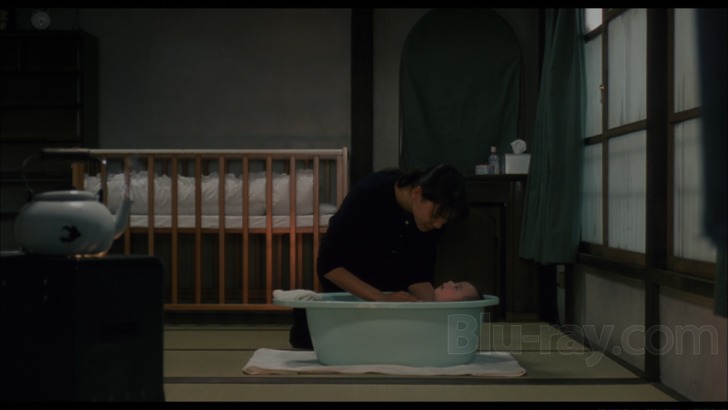
Maborosi's LPCM 2.0 track is quite enjoyable, if intentionally quiet at times (a lot of the film plays out in almost wordless tableaux). The film's lovely score by Ming-Chang Chen, which features a lot of piano, sounds vibrant and full bodied without any unnecessary or unwanted shrillness or brightness. Dialogue is also rendered cleanly and clearly, and the environmental effects also resonate with authenticity throughout the presentation.
Maborosi Blu-ray Movie, Special Features and Extras 

- Commentary by Linda Ehrlich is consistently interesting, offering insights into everything from color schemes that identify different sections of the film to the use of dialects which "locate" certain characters. Ehrlich does have a tendency to speak for a minute and then not say anything for a while, so it's best to "stay tuned", so to speak.
- Birthplace (480i; 29:52) is a kind of odd featurette with Makiko Esumi touring various locations. There are long, lingering (wordless) shots of Esumi on a bus interspersed with stills that feature subtitles, along with some moments of Esumi actually speaking on screen as she looks at different places.
Maborosi Blu-ray Movie, Overall Score and Recommendation 
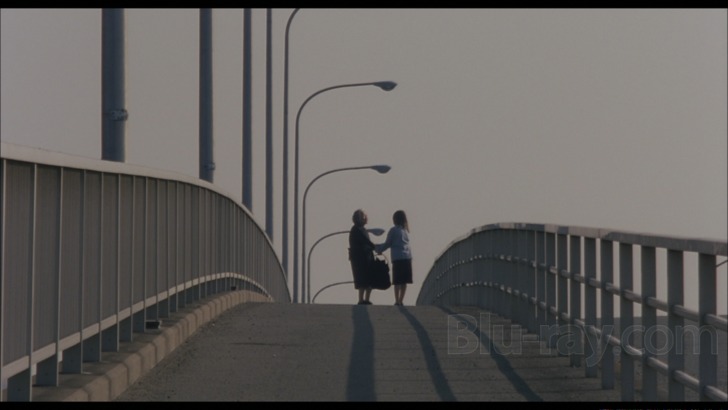
Maborosi is slow going at times, and it may in fact not pay off with an overwhelming amount of emotional catharsis, but it's a really involving, contemplative viewing experience that provides some thoughtful musings on love, loss and trying to come to terms with the sometimes unfathomable vagaries of fate and misfortune. I found some aspects of the video presentation problematic, but audio is great and both the commentary and featurette are interesting (even if the featurette is a bit on the odd side). Recommended.
Similar titles
Similar titles you might also like

After Life
ワンダフルライフ / Wandafuru raifu
1998

Still Walking
歩いても 歩いても / Aruitemo aruitemo
2008

Mustang
2015

After the Storm
海よりもまだ深く / Umi yori mo mada fukaku
2016

I Wish
Miracle / 奇跡 | Kiseki
2011

Late Spring
晩春 | 4K Restoration
1949

The Marriage of Maria Braun
Die Ehe der Maria Braun
1978

Sundays and Cybèle
Les dimanches de Ville d'Avray
1962

Umberto D.
1952

Beyond the Hills
După dealuri
2012

Leviathan
Левиафан / Leviafan
2014

Apur Sansar 4K
অপুর সংসার / The World of Apu
1959

The Club
El Club
2015

About Elly
Darbareye Elly
2009

Pioneer
Pionér
2013

Rust and Bone
De rouille et d'os
2012

Like Father, Like Son
2013

La Strada
1954

Zama
2017

A Man Called Ove
En man som heter Ove
2015
